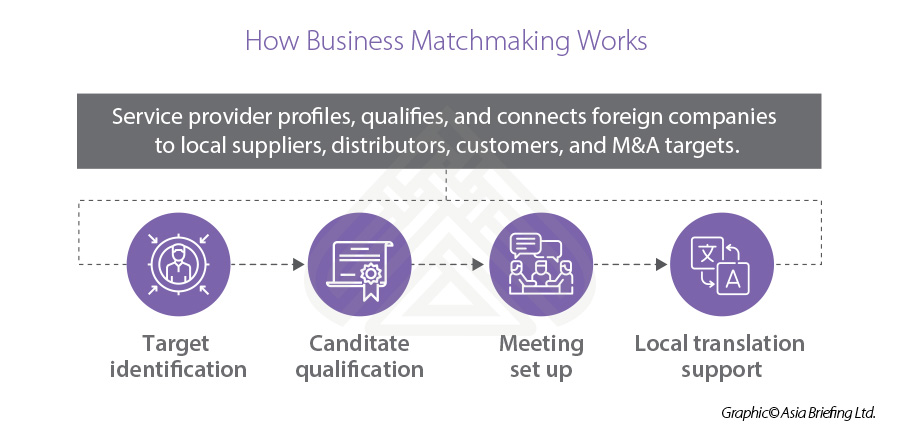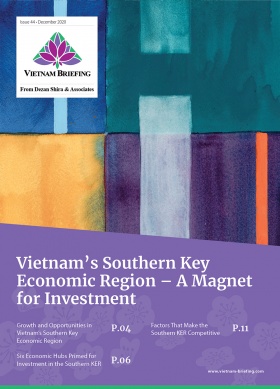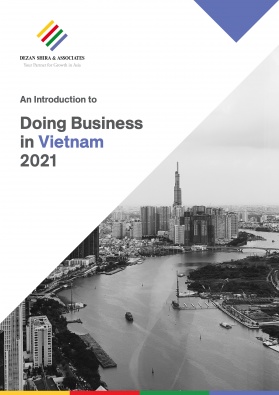How Our Business Matchmaking Services Can Help Your Vietnam Market Strategy
- Business matchmaking services are an essential part of identifying local partners for a strategic collaboration with a foreign investor.
- Typically, foreign investors choose an M&A or a JV to enter the Vietnam market.
- It is therefore imperative for investors to do their due diligence and employ business matchmaking services to choose the right local partner.
Business matchmaking services help foreign companies identify and connect with local partners in international markets. Factors influencing the choice of the ideal local partner varies; they may share common business interests with the foreign company, offer complementary expertise and services, and/or provide key technology. Essentially, the matchmaking process at the market entry stage is about the foreign company strategizing for business growth and expansion in the local market.
In this article, we explain what constitutes business to business matchmaking, what are its advantages when strategizing your Vietnam market entry, and what are the challenges frequently faced by foreign investors in the process.
Planning your Vietnam market entry: The case for business-to-business matchmaking
Many foreign companies choose to access the Vietnam market by developing a joint venture (JV) relationship with a Vietnamese partner or enter into a merger and acquisition (M&A). This is considered for many reasons. For one, it may simply be the most affordable option available to the foreign investor. More often, it is a strategic decision so that the foreign company can tap into the established distribution and marketing channels, financial resources, and established contacts of the Vietnamese partner.
With several sectors in Vietnam removing limits on foreign direct investment (FDI) – market access and the scope for investment maneuverability by foreign businesses has increased. Yet, even as an M&A or JV is considered as the ideal market entry route by the foreign company, finding the right partner is not an easy process.
Here, opting for business-to-business (B2B) matchmaking services from reliable professional service providers based in the local market – is a good strategy. It cushions the foreign company from getting into business with unscrupulous firms or navigating without support and key information in a new market that might be very different from the home country.
Choosing a B2B matchmaking services provider can enable the foreign company to find the right domestic partner by ensuring both parties are in agreement over business goals, capacity, and mutually aligned benefits. It also helps avoid one or the other partner from engaging in bad-faith practices.
What constitutes business matchmaking services?
When a foreign company opts for B2B matchmaking services – they are essentially approaching a service provider with specific requirements in mind.
The requirements include but are not limited to the target company size, location, manufacturing and export/import capacity, and product portfolio, among other considerations. This means the foreign company has an intended economic activity, is seeking collaboration with players in the local market, and needs a third-party to structurally facilitate this partnership.
Upon receiving this information from the client company, the service provider then conducts customized secondary research to compile a long list of potential partners that could meet the client’s criteria and screen them against the bespoke requirements of the client.
At the next stage, the client company shortlists the prospective partners from the long list of companies, according to their basic data provided. Once the list of preferred partners is finalized by the foreign company, the service provider reaches out, on the company’s behalf, to gauge the interest of the prospective local partner firm.
If both parties are up to it, the service provider connects the shortlisted companies with the client company. This involves setting up meetings, exchanging product samples, etc. between the client and potential partners.
What are some common challenges faced during the matchmaking process?
The success of business matching projects is often dependent on factors that are beyond the service provider’s control.
These include the reaction of local manufacturers to the foreign client company’s own products based on pricing, offering, branding, local business culture, current economic conditions, etc. These factors could impact the number of entities that are interested in discussing the partnership opportunity with the client company.
To avoid such scenarios, the foreign company needs to be aware of the local sourcing and manufacturing landscape and plan accordingly – rather than expecting to readily find a like-minded partner. Prospective local partner entities may also be at different business stages and thus not capable of providing the required support.
Other challenges relate to information asymmetry – delays in the follow-up process with interested local entities who take longer than expected to revert to client queries due to the unavailability of senior management, incomplete information about companies on record, etc.
How B2B matchmaking services work in the Vietnamese market
With regards to the Vietnam market, the following are key components of the business matchmaking service scope:
Overcoming the local language barrier
Foreign companies often face communication challenges due to a language barrier, especially when engaging with small and medium manufacturers, suppliers, and distributors. The service provider thus acts as an intermediary and assists the client company by being an effective communication channel between the foreign company and potential local partners.
Managing communication online/offline
Most local suppliers and distributors are slow to responding to emails, as most of their business is conducted through face-to-face meetings and with partners with whom they have been working for a long period of time. This is where the service provider can play a useful role – ensuring that clients receive prompt response from such partners, by continuously following up with them on the phone or through in-person meetings.
Establishing point of contact in senior management
Much of the initial communication is generally struck with the junior management and/or sales team of the potential partner company, which can delay getting relevant responses from senior management in the company. In such situations, the service provider sources the contact information of the senior management personnel and ensures that key decision-makers are looped in early to reduce delays.
Target partner in niche sectors
Finding partners in niche sectors is a major hurdle in Vietnam due to the lack of any credible information online. To overcome this issue, the service provider utilizes its existing databases covering several sectors and works closely with its local partners to find capable local companies in target niche sectors.
Sourcing partner information – doing preliminary due diligence
Most small and medium enterprises (SMEs) do not have updated websites – even if they do have websites – which leads to a lack of clarity about the company profile, capabilities, and/or management. To overcome this, the service provider ensures that we gather information directly from the companies themselves or reach out to existing partners to ensure that the client company has access to key information about a potential supplier/manufacturer/distributor before making an executive decision.
Our Business Matchmaking service profiles, qualifies, and connects foreign companies to local suppliers, distributors, customers, and M&A targets. For more information, please feel free to contact our professional service advisors at vietnam@dezshira.com.
About Us
Vietnam Briefing is produced by Dezan Shira & Associates. The firm assists foreign investors throughout Asia from offices across the world, including in Hanoi and Ho Chi Minh City. Readers may write to vietnam@dezshira.com for more support on doing business in Vietnam.
- Previous Article Vietnam’s Economic Growth On Track as National Party Congress Concludes
- Next Article FDI in Vietnam: A Year in Review and Outlook for 2021































